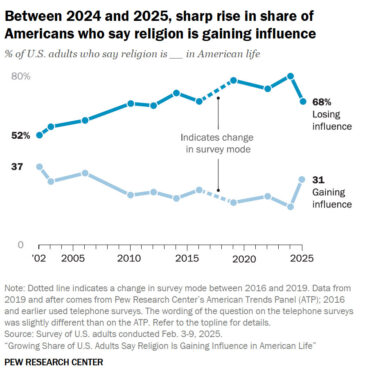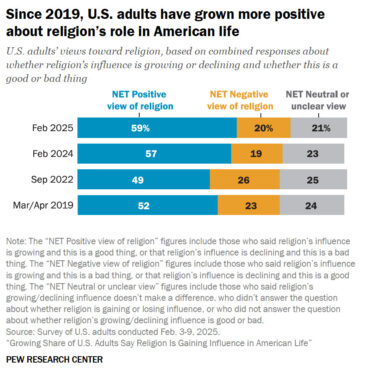
(RNS) — After years of decline, a growing number of Americans believe religion is on its way back, a new study from Pew Research Center suggests.
The report, published Monday (Oct. 20), found that about a third of Americans (31%) said religion is gaining influence in the country — up from 18% a year ago.
“While this remains a minority view, it is increasingly held by adults across several demographic groups — with gains of at least 10 percentage points among Democrats and Republicans, adults in every age category and in most large religious groups,” the report described.
Jewish Americans (44%) were most likely to say religion’s influence is on the rise, followed by white evangelicals (36%) and atheists (38%). Black Protestants (26%), Catholics (27%) and those with no particular religion (27%) were less likely to agree.
The idea that the influence of religion is declining in American culture has paralleled the rise of so-called nones, or those who have no religious affiliation. In 2007, 16% of Americans claimed no religion, according to Pew. That number continued to climb until leveling off at about 30% in recent years.
In 2002, 52% of Americans said that religion’s influence was declining. That number reached 80% last year before dropping to 68% this year.

Between 2024 and 2025, sharp rise in share of Americans who say religion is gaining influence. Pew Research Center
The report, based on data from Pew’s American Trends Panel collected in February and May, also found that a growing number of Americans (59%) said they have a net-positive view of religion’s role in society, up from 49% in 2022. Twenty percent have a net negative view, while 21% indicated an unclear or neutral view.
President Donald Trump made returning religion to power in American life a key part of his campaign to return to the White House. Republicans and those who lean Republican were most likely (78%) to claim a positive view of religion in society. Democrats and those who lean Democratic were much less likely (40%) to say it had a positive impact.
Those ages 65 and older were more likely (71%) to indicate a positive view of religion in society than those younger than 30 (46%).
Atheists (6%) and agnostics (11%) were the least likely to say they have a positive view of religion in public life. White evangelicals (92%) and Black Protestants (75%) were most likely, among faith groups. Jews (36%) and those with no particular religion (33%) were somewhere in between.
Overall, positive views of religion were on the uptick.
‘The share of Americans expressing positive views of religion in 2024 and 2025 are up significantly from 2022 and 2019, indicating an overall shift toward more positive views about religion’s role in American life over the past five years or so,” researchers wrote.
For the study, researchers asked Americans a number of questions about the intersection of religion and society, including whether being patriotic was an essential part of their faith and if they saw a conflict between their faith and broader culture.
Researchers found that 58% of Americans say their religious views are at odds with mainstream culture — including 21% who said they feel great conflict — up from 42% in 2020. White evangelicals (80%), Jews (62%) and atheists (61%) reported the highest level of conflict. Agnostics (48%) and those with no particular faith (37%) reported the lowest conflict.
While Americans see patriotism as important, few saw it as an important part of their faith.
“Among U.S. Jews, 22% say loving your country is essential to Jewish identity, while 32% say it is important but not essential. And 46% say loving your country is not important to being Jewish,” according to the report.
Researchers found similar attitudes among Christians and the unaffiliated. Twenty-nine percent of Christians overall said being patriotic was essential to their faith, while 47% said it was important but not essential. Sixteen percent of the unaffiliated said loving your country was essential to being a good person, while 43% said it was important.
“Republican Christians are somewhat more likely than Democratic Christians to say loving
your country is essential to being Christian (33% vs. 23%),” researchers wrote. “Still, far fewer than half of Christians in both parties say loving their country is core to their religion.”
For Christians, traits like being honest (86%), treating people with kindness (85%), believing in God (85%), having a personal relationship with Jesus (75%) and helping others in need (66%) were seen as essential by respondents. Attending religious services (28%) was seen as least essential, followed by continuing family traditions (29%) or being part of a community (33%).

Since 2019, U.S. adults have grown more positive about religion’s role in American life. Pew Research Center
Overall, Americans said they were open-minded about religion. About half (48%) said many faiths may be true, while just over a quarter (26%) said only one faith is true. But a similar number (24%) said there is little (18%) or no truth (6%) in any religion.
Atheists and evangelicals were most at odds over the truth claims of religion. Eighty-seven percent of atheists said there was little or no truth in religion — as opposed to 4% of evangelicals. And, 38% of Republicans said only one religion is true. Only 16% of Democrats agreed.
For the report, Pew relied on findings from a survey of 9,544 Americans conducted Feb. 9-13, 2025 and a survey of 8,937 Americans from May 5-11. Both groups were drawn from Pew’s American Trends Panel.

